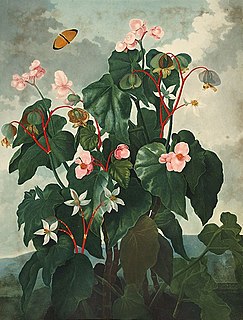
Begonia is a genus of perennial flowering plants in the family Begoniaceae. The genus contains more than 2,000 different plant species. The Begonias are native to moist subtropical and tropical climates. Some species are commonly grown indoors as ornamental houseplants in cooler climates. In cooler climates some species are cultivated outside in summertime for their bright colorful flowers, which have sepals but no petals.
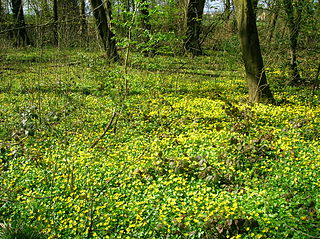
In forestry and ecology, understory, or understorey, also known as underbrush or undergrowth, comprises plant life growing beneath the forest canopy without penetrating it to any great extent, but above the forest floor. Only a small percentage of light penetrates the canopy so understory vegetation is generally shade-tolerant. The understory typically consists of trees stunted through lack of light, other small trees with low light requirements, saplings, shrubs, vines and undergrowth. Small trees such as holly and dogwood are understory specialists.
The University of South Florida Botanical Gardens 15 acres are located on the campus of the University of South Florida in Tampa, Florida, United States, and consist of 7 acres of developed gardens plus 6 to 9 acres of natural greenbelt. It is a member of the American Public Gardens Association, American Horticulture Society Reciprocal Admissions Program, Greater Temple Terrace Chamber of Commerce, and Visit Florida and receives about 35,000 visitors annually. The gardens are open to the public during weekday business hours, and on shorter weekend hours. Admission is $5 for adults.

Mounts Botanical Garden is a botanical garden located in West Palm Beach, Florida. It is Palm Beach County's oldest and largest public garden with over 2,000 species of tropical and subtropical plants from six continents, including plants native to Florida, exotic trees, tropical fruit, herbs, citrus and palms. Mounts is a component of the Palm Beach County Cooperative Extension Service and is affiliated with the University of Florida / IFAS.
Begonia adpressa is a species of plant in the family Begoniaceae. It is endemic to Cameroon. Its natural habitats are subtropical or tropical moist lowland forests and subtropical or tropical moist montane forests. It is threatened by habitat loss.
Begonia compacticaulis is a species of plant in the family Begoniaceae. It is endemic to Ecuador. Its natural habitats are subtropical or tropical moist lowland forests and subtropical or tropical moist montane forests. It is threatened by habitat loss.
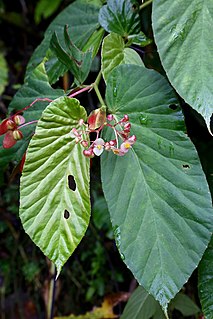
Begonia consobrina is a species of plant in the family Begoniaceae. It is endemic to Ecuador. Its natural habitats are subtropical or tropical moist lowland forests and subtropical or tropical moist montane forests. It is threatened by habitat loss.
Begonia dodsonii is a species of plant in the family Begoniaceae. It is endemic to Ecuador. Its natural habitats are subtropical or tropical moist lowland forests and subtropical or tropical moist montane forests. It is threatened by habitat loss.
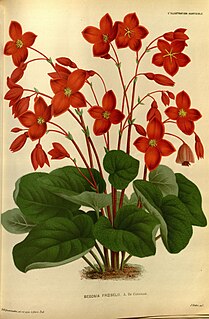
Begonia froebelii is a species of plant in the family Begoniaceae. It is endemic to Ecuador. Its natural habitats are subtropical or tropical dry forests and subtropical or tropical moist montane forests. It is threatened by habitat loss.
Begonia furfuracea is a species of plant in the family Begoniaceae. It is found in Cameroon and Equatorial Guinea. Its natural habitat is subtropical or tropical moist lowland forests. It is threatened by habitat loss.
Begonia ludwigii is a species of plant in the family Begoniaceae. Its natural habitats are subtropical or tropical moist lowland forests and subtropical or tropical moist montane forests. It is threatened by habitat loss and it is endemic to Ecuador.
Begonia napoensis is a species of plant in the family Begoniaceae. It is endemic to Ecuador. Its natural habitats are subtropical or tropical moist montane forests and subtropical or tropical high-altitude shrubland.

Begonia oxyanthera is a species of plant in the family Begoniaceae. It is found in Cameroon, Equatorial Guinea, and possibly Nigeria. Its natural habitats are subtropical or tropical moist lowland forests and subtropical or tropical moist montane forests. It is threatened by habitat loss.
Begonia parcifolia is a species of plant in the family Begoniaceae. It is endemic to Ecuador. Its natural habitats are subtropical or tropical moist lowland forests and subtropical or tropical moist montane forests. It is threatened by habitat loss.
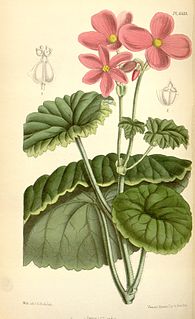
Begonia socotrana is a species of plant in the family Begoniaceae. It is endemic to Yemen. Its natural habitats are subtropical or tropical dry forests, subtropical or tropical dry shrubland, and rocky areas.
Begonia sodiroi is a species of plant in the family Begoniaceae. It is endemic to Ecuador. Its natural habitats are subtropical or tropical moist lowland forests, subtropical or tropical moist montane forests, and subtropical or tropical high-altitude shrubland. It is threatened by habitat loss.
Begonia triramosa is a species of plant in the family Begoniaceae. It is endemic to Ecuador. Its natural habitats are subtropical or tropical moist lowland forests and subtropical or tropical moist montane forests. It is threatened by habitat loss.
Begonia valvata is a species of plant in the family Begoniaceae. It is endemic to Ecuador. Its natural habitats are subtropical or tropical moist lowland forests and subtropical or tropical moist montane forests. It is threatened by habitat loss.
Begonia rubroracteolata is a species of Begonia was found in the forests of Sarawak, Borneo, where 28 other Begonia species live. The discovery was found in 2016 by S.Julia & C.Y.Ling. The small plant grows on sandstone boulders and do well in shaded areas. This herb, which is critically endangered, was found on one site of forest conversion.
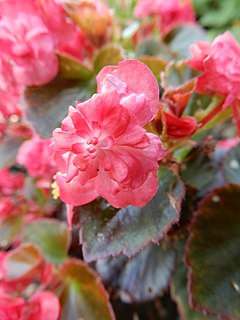
Begonia cucullata, also known as wax begonia and clubed begonia, is a species of the Begoniaceae that is native to South American countries of Argentina, Brazil, Paraguay, and Uruguay. A common garden plant and part of the section Begonia, it was described in 1805 by Carl Ludwig Willdenow (1765–1812). The specific epithet "cucullata" means "resembling a hood" or "hooded".








